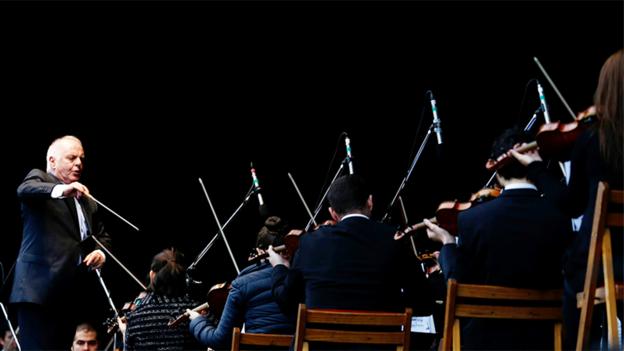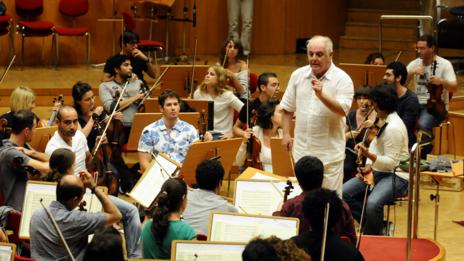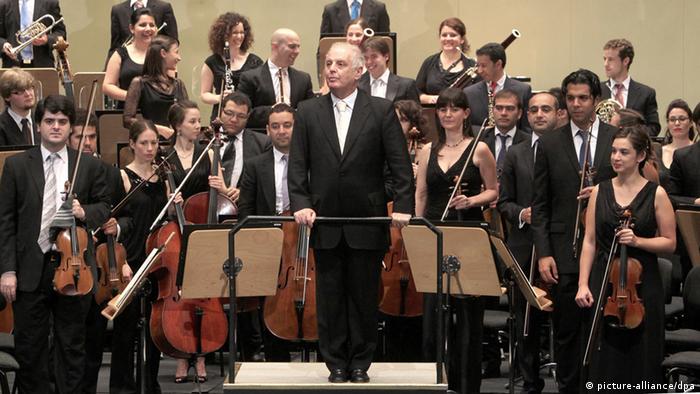http://www.bbc.com/culture/story/20140822-music-uniting-arabs-and-israelis
West-Eastern Divan Orchestra: Uniting Arabs, Israelis

Clemency Burton-Hill

Daniel Barenboim conducts the West-Eastern Divan Orchestra (Reuters)
Legendary conductor Daniel Barenboim leads an orchestra that brings together people from groups in conflict in the Middle East. Clemency Burton-Hill reports.On the last night of the year in 2008, I received an email I’ll never forget.
A few weeks prior – following an impromptu audition backstage at the Metropolitan Opera in New York – I had been invited by the conductor Daniel Barenboim to join the members of his West-Eastern Divan Orchestra as an embedded journalist and ‘honorary violinist’ on their 10th anniversary tour.
Barenboim is an Argentine-born Israeli, who now also holds a Palestinian passport. In 1999, he founded the West-Eastern Divan – the title is based on a set of poems by Goethe – with the late Palestinian literary critic Edward Said. In inviting me to go on tour with the Divan, as it is known by its members, he was offering me a completely unique opportunity to witness the workings of the orchestra – which is made up of over one hundred Israeli and Arab musicians from the very heart of the orchestra, inside the ranks of the first violins.
We were to go to Qatar, Egypt, Russia, Germany, Austria and Italy in early January. We were to play music by Beethoven, Verdi, Wagner, Mozart and Schönberg. And we would perform in some of the world’s greatest halls including Vienna’s Musikverein and Milan’s La Scala.
And then, on 27 December, war broke out in Gaza. I wondered what this would mean for the West-Eastern Divan. Would any orchestral members boycott the tour? Would it all go ahead as planned? When the chips were down, how truly committed were this group of young musicians from opposite sides of the divide to engaging with each other? On New Year’s Eve, I clicked open my inbox. The tour dates in Doha and Cairo had been cancelled for security reasons; Maestro Barenboim would understand and support any member of the orchestra who felt they could not join the tour in “such difficult circumstances for everyone involved”; but it was times like these that made the existence of the Divan all the more vital. Attached to the email was an editorial Barenboim had written about the war in Gaza, which also laid out his three wishes for the New Year.
In the end, not a single Arab or Israeli member of the Divan boycotted that tour: from Israel, from the Palestinian territories, from Syria, Lebanon, Jordan and Egypt, they came together for a tough, but triumphant, two weeks.
And it was a fortnight that changed my life. The West-Eastern Divan is not an ‘orchestra for peace’, as it is so often dubbed, but an ‘orchestra against ignorance’ – mine, too. It is a singular space in which human beings who are otherwise forcibly kept apart can come together to exchange ideas and views, learn about each other and, above all, listen to each other in a world that would otherwise keep them silent.
No barriers
I have thought often about that New Year email and Barenboim’s three wishes for Gaza since the latest war in the region began in July. Here we are, over five years later, and the situation in the Middle East is somehow – unimaginably – worse.
And yet the members of the West-Eastern Divan meet on, play on and through their courage in the face of increasing hostility at home – not a single government represented by the orchestra’s members gives them its blessing – they are the living, breathing proof of a model in which Arabs and Israelis do come together. It isn’t perfect: there is plenty of disagreement within its ranks; but nor is it the product of some kind of utopian idealistic vision. Since the orchestra’s almost accidental inception fifteen years ago, hundreds of Arabs and Israelis have participated, and their daily discussions and debates about the conflict and the situation in the Middle East are as fundamental to their programme as the music rehearsals and concerts.
Engaged on their annual summer tour, which this year includes their own 10-day festival in Buenos Aires as well as major music festivals in Lucerne, Salzburg and Berlin, Barenboim and the West-Eastern Divan arrived in London the week of 18 August. Against a backdrop of broken ceasefire announcements and unbroken strife between their peoples back home, the orchestra gave a BBC Proms performance 20 August that ended in no fewer than five encores from the rapturous audience at the Royal Albert Hall. Wherever you are in the world, you can listen to the concert here via the BBC Radio 3 website.

Hundreds of Arabs and Israelis have participated in the orchestra since its inception fifteen years ago (Corbis)
With a programme that included Ravel’s beautiful Pavane for a Dead Princess and special commissions by two Middle Eastern composers, the Israeli Ayal Adler and the Syrian Kareem Roustom, it is hard to think of a more moving concert. As in 2009, no members of the orchestra have boycotted this tour, and backstage the sense of communal pride that even in this year of all years they were doing this was palpable. No question: Israeli, Palestinian, Syrian, Jewish, Muslim, Christian – they were in this together.
Out of many, one
“The only way out of this tragedy, the only way to avoid more tragedy and horror, is to take advantage of the hopelessness of the situation and force everybody to talk to one another,” Barenboim commented in the Guardian on the situation in Gaza a few weeks ago, speaking of a “need for a mutual feeling of empathy, or compassion”. He went on: “in my opinion, compassion is not merely a sentiment that results from a psychological understanding of a person’s need, but it is a moral obligation. Only through trying to understand the other side’s plight can we take a step towards each other.”
Notwithstanding those Arab and Israeli commentators who view Barenboim and his orchestra as ‘traitors’ to their people for what they view as normalising relations with the enemy, many otherwise sympathetic people might view the idea of taking steps towards each other through music with outright cynicism. “But what difference can music make?” is a refrain I have heard over and over again when discussing the Divan. “Isn’t all this just spectacularly naïve?”
Over the years, I have interviewed Barenboim on many occasions and I can say with certainty that he is the least naïve person I have encountered. His polymathic intellect is not only razor-sharp but highly analytical. Of course, he is under no delusion that music might directly create the conditions for peace in the region. But, as he said on the BBC’s Newsnight programme: in these times “we cannot afford the luxury of pessimism”.
The model of the West-Eastern Divan is utterly unique. On a musical level, it can proudly take its place along with the myriad great orchestras that grace the Proms – it contains within its ranks many leading musicians including a former Concertmaster of the Berlin Philharmonic. But that person, an Israeli, Guy Braunstein, shares a desk with a 17-year-old Palestinian named Yamen Saadi.
The Divan not only encourages, but dares us to imagine what might – still, somehow – be possible one day.
大都會不缺錢,也不缺人才,為什麼這麼多人到這家美國首息歌劇院的時候,接受這麼低的標準?謎底是,大都會對正典採取博物館式的態度,而不是採取前衛的立場,因此一再辜負它所照顧的傑克,而不是仔細、用心製造它們。
Edward W. Said 《音樂的極境‧特洛依人》台北:太陽社,2010,頁257
音樂的極境:薩依德音樂評論集 Music at the Limits
- 作者:薩依德
- 原文作者:Edward W. Said
- 譯者:彭淮棟
- 出版社:太陽社
- 出版日期:2009年
全書以清新的角度賞析經典作品,也以他人不及的眼光品題為人冷落的當代作曲家作品。薩依德批評紐約大都會歌劇院過於保守,也惋惜帕華洛帝有超級巨星之 譽,卻「將歌劇演出的智慧貶到最低,把要價過高的噪音推到最大」。此外,他思考以色列禁演華格納的問題,音樂節愈來愈浮濫的令人憂心趨勢,以及以馬爾孔X 生平為主題的歌劇,音樂與女性主義的關係,鋼琴家顧爾德,及莫札特、巴哈、理查史特勞斯等名家的作品。
薩依德以內行人的造詣,權威的身 分,書寫精闢犀利的批判。他在音樂裡看出文學與歷史理念的反映,並密切觀察其構成和創造的潛力。《音樂的極境》情文並茂,處處發人深省,呈現薩依德思想事 業的一個重要層面,進一步證明,作為廿世紀最具影響力、最勇於突破的學者之一,他實至名歸。
薩依德除了著名的後殖民論述,並精通文化研 究與音樂,本身具有鋼琴演奏家的水準,終身對西方古典音樂擁有激情,《音樂的極境》收集1983-2003年間的音樂評論,他以專業樂評家的角色討論作為 文化場域的古典音樂,清晰深入。本書的出版呈現薩依德更全面和多方位的專長與論述,可彌補過去中文翻譯與評介的不足。
薩依德在《音樂的 極境》談論音樂以鋼琴和歌劇為主,本精選輯亦選取這兩類作品,包括顧爾德彈奏的巴哈G大調第五號鋼琴組曲、哈絲改編的巴哈聖詠曲鋼琴版〈耶穌,世人渴望的 喜悅〉、土耳其國寶級女鋼琴家Idil Biret詮釋的蕭邦,以及被稱為「擁有近數十年來最強卡司陣容」的《費黛里奧》歌劇選曲等。
作者簡介
薩依德 Edward W. Said
1935年生於巴勒斯坦的耶路撒冷,接受過英式教育,取得哈佛大學博士學位,哥倫比亞大學英文系與比較文學教授,擔任《The Nation》雜誌樂評,著作等身,包括《鄉關何處》、《文化與帝國主義》、《東方主義》。他由哥倫比亞大學出版社出版的著作包括《康拉德與自傳小說》、 《人文主義與民主的批評》、《開始:意圖與方法》、《音樂的闡釋》,及《並行與弔詭》。2003年逝於紐約。
譯者簡介
彭淮棟
1953年生。譯有《後殖民理論》(Bart Moore-Gilbert)、《意義》(博藍尼)、《俄國思想家》(以撒.柏林)、《自由主義之後》(華勒斯坦)、《西方政治思想史》(麥克里蘭)、 《鄉關何處》(薩依德)、《現實意義》(以撒.柏林)、《貝多芬:阿多諾的音樂哲學》(阿多諾)、《美的歷史》和《醜的歷史》(艾可)等書。
Music at the Limits
Music at the Limits is the first book to bring together three decades of Edward W. Said's essays and articles on music. Addressing the work of a variety of composers, musicians, and performers, Said carefully draws out music's social, political, and cultural contexts and, as a classically trained pianist, provides rich and often surprising assessments of classical music and opera.
Music at the Limits offers both a fresh perspective on canonical pieces and a celebration of neglected works by contemporary composers. Said faults the Metropolitan Opera in New York for being too conservative and laments the way in which opera superstars like Pavarotti have "reduced opera performance to a minimum of intelligence and a maximum of overproduced noise." He also reflects on the censorship of Wagner in Israel; the worrisome trend of proliferating music festivals; an opera based on the life of Malcolm X; the relationship between music and feminism; the pianist Glenn Gould; and the works of Mozart, Bach, Richard Strauss, and others.
Said wrote his incisive critiques as both an insider and an authority. He saw music as a reflection of his ideas on literature and history and paid close attention to its composition and creative possibilities. Eloquent and surprising, Music at the Limits preserves an important dimension of Said's brilliant intellectual work and cements his reputation as one of the most influential and groundbreaking scholars of the twentieth century.
Music at the Limits offers both a fresh perspective on canonical pieces and a celebration of neglected works by contemporary composers. Said faults the Metropolitan Opera in New York for being too conservative and laments the way in which opera superstars like Pavarotti have "reduced opera performance to a minimum of intelligence and a maximum of overproduced noise." He also reflects on the censorship of Wagner in Israel; the worrisome trend of proliferating music festivals; an opera based on the life of Malcolm X; the relationship between music and feminism; the pianist Glenn Gould; and the works of Mozart, Bach, Richard Strauss, and others.
Said wrote his incisive critiques as both an insider and an authority. He saw music as a reflection of his ideas on literature and history and paid close attention to its composition and creative possibilities. Eloquent and surprising, Music at the Limits preserves an important dimension of Said's brilliant intellectual work and cements his reputation as one of the most influential and groundbreaking scholars of the twentieth century.
Related Subjects
Series
About the Author
| ||||||||
| 作者介紹 | ||||||||
| ||||||||
| 名人/編輯推薦 | ||||||||
|
| 序/書摘 | |
| |
| 目次 | |
|


 Barenboim - the pianist
Barenboim - the pianist  Argentinian-Israeli conductor Daniel Barenboim with the West-Eastern Divan Orchestra
Argentinian-Israeli conductor Daniel Barenboim with the West-Eastern Divan Orchestra  An exceptional artist
An exceptional artist  Music has the power to break down borders, Barenboim believes
Music has the power to break down borders, Barenboim believes